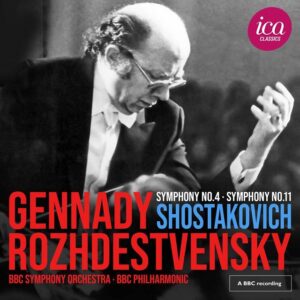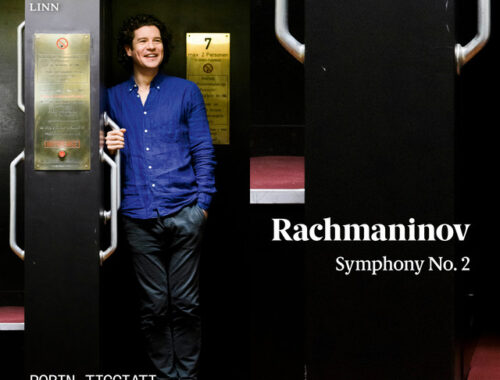GRAMOPHONE Review: Shostakovich Symphonies Nos. 4 & 11 ’The Year 1905’ – BBC SO/BBC Philharmonic/Rozhdestvensky
 I don’t think anybody would deny that there were times when Gennady Rozhdestvensky wore his craft so lightly, so casually, that the impression he was ‘coasting’ on his laurels did neither himself nor his orchestras any favours. His nickname ‘Noddy’ came from his refusal to stand on a podium but rather to communicate to his players in nods and smiles from, as it were, a more democratic position ‘amidst’ the orchestra. Like many of the great Russians it was impossible to predict whether one was likely to experience the best or worst of him. This is the best of him.
I don’t think anybody would deny that there were times when Gennady Rozhdestvensky wore his craft so lightly, so casually, that the impression he was ‘coasting’ on his laurels did neither himself nor his orchestras any favours. His nickname ‘Noddy’ came from his refusal to stand on a podium but rather to communicate to his players in nods and smiles from, as it were, a more democratic position ‘amidst’ the orchestra. Like many of the great Russians it was impossible to predict whether one was likely to experience the best or worst of him. This is the best of him.
Any and everyone who loves Shostakovich as I do needs to hear this performance of the renegade Fourth Symphony. It had somehow escaped me that Rozhdestvensky had given the Western premiere of the work at the Edinburgh Festival of 1962. He knew the composer, he knew the history, he knew how significant it was that this wild and wonderful departure for Shostakovich had to be secreted away for fear that he and it would fall foul of Stalin’s purge on so-called ‘formalism’ in music. Essentially anything that didn’t celebrate the Soviet State and set Stalin’s toe tapping.
In this electrifying performance from 1978 (at the Royal Albert Hall) Rozhdestvensky galvanises the BBC Symphony Orchestra into thinking that this is the first performance, that this ambitious post-Mahlerian epic is at the very cusp of where sonata-form is exploded and new frontiers are dramatically established. He positively revels in its bold and subversive shock-tactics. This is Shostakovich kicking off. The opening March (Mahler 3 anyone?) breaks through shrieks of derision to forge a relentless path gathering ferociously dissonant counterpoint as it does so. Rozhdestvensky has the E-flat clarinet punching well above its weight, demanding to be heard, and all those startling departures from form, all those volte-faces, are pushed and then pushed some more. The now infamous string fugue is a shock from the moment it is released from the traps at breakneck speed. Never faster.
In short, the symphony sounds more radical than I’ve heard it sound in years – and the engineering, for its time, is remarkable. Just imagine what the Soviet establishment open-mouthed at the composer’s last-ditch attempt at some kind of triumphant resolution – roundly denied, of course, by tortuous dissonance and a driving timpani ostinato. Tattered flags raised full-mast.
So I’d put this Fourth at the top of my pile for sheer belligerence and daring. The Eleventh ‘The Year 1905’ (in many way my favourite of the canon) has fiercer competition sonically with recent accounts from Storgards and Inbal delivering in spades – and though this 1997 BBC recording again sounds pretty good (indeed more immediate than the Fourth) there are choices I don’t share. The January 9 massacre with its remorseless battery of percussion is very deliberate which you might argue adds to the brutality and certainly to the crudeness (the chromatic trombones are super-menacing) but I’m not at all sure about Rozhdestvensky’s swift tempo (Adagio) for the slow movement ‘Memory Eternal’. Again you may argue that the funeral song ‘You Fell As Victims’ demands an underlying imperative – as in ‘no time to grieve’ – but I’m not so sure. No such misgivings about the trenchant finale which is thrillingly unvarnished, crudely militaristic. The famous cor anglais solo is not just spotlit but illuminated – a beacon of sorrow and hope. But the major/minor clamour of bells in the restless coda is hopelessly muted for want of real Liverpool Phil church bells (now available for hire!) under assault from metal mallets.
But this is a must-hear disc and no mistake – and the Fourth is as good as it gets.

COMPARING NOTES with ALFIE FRIEDMAN
You May Also Like

GRAMOPHONE Review: Rachmaninov Symphony No.2 – Deutsches Symphonie-Orchester Berlin/Ticciati
10/11/2021
COMPARING NOTES with JACOB FOWLER
23/03/2023
